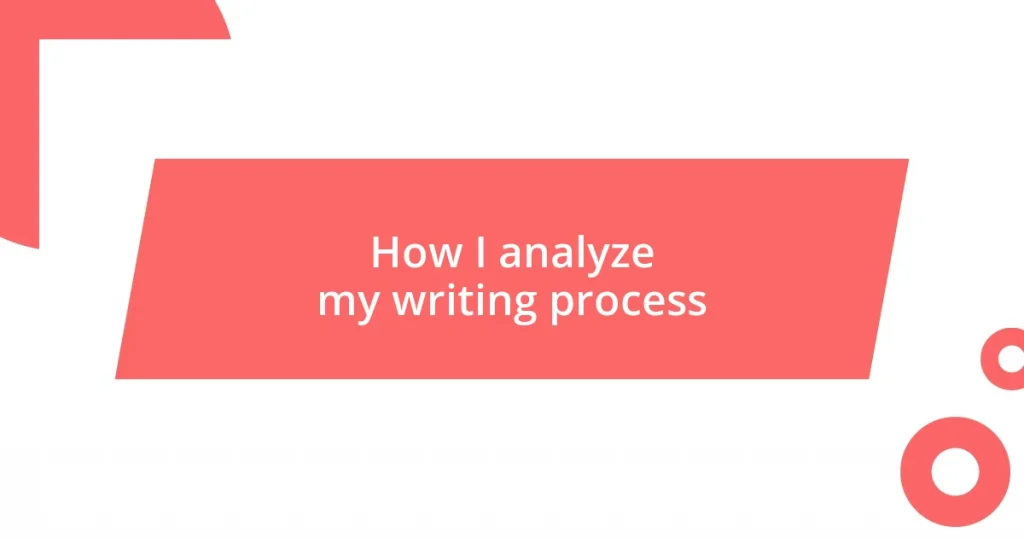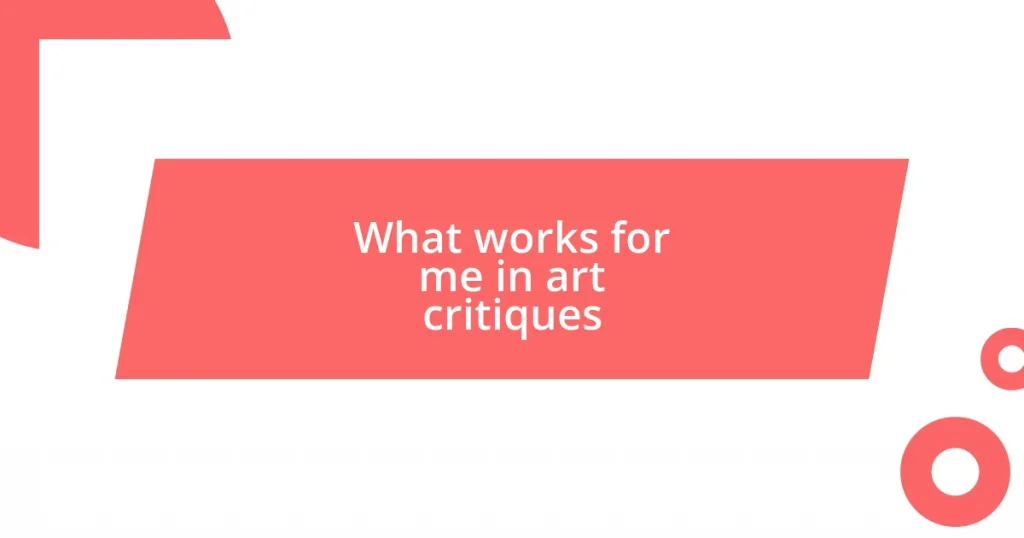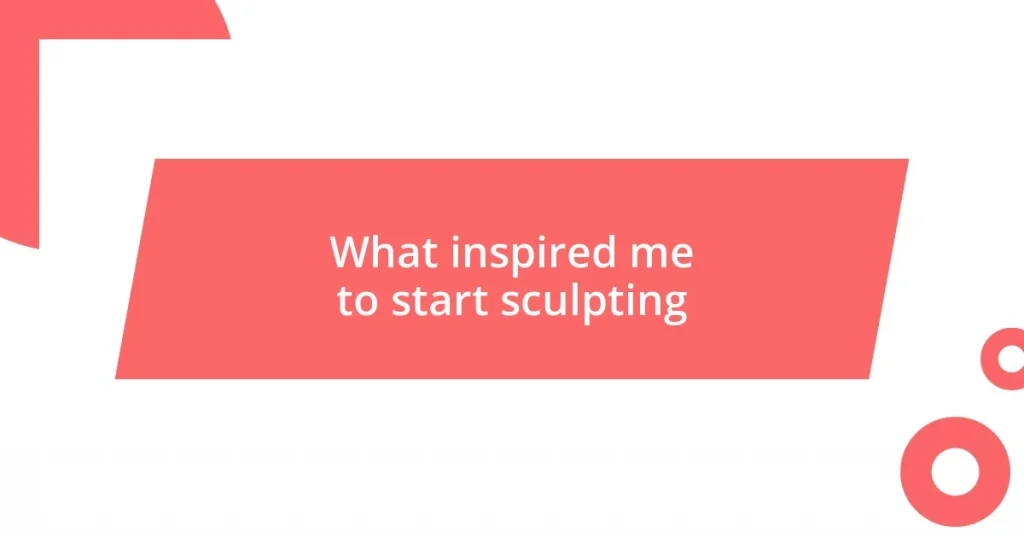Key takeaways:
- Inspiration often comes from quiet reflection, with brainstorming and revision playing critical roles in organizing thoughts and enhancing clarity in writing.
- Setting specific, measurable writing goals fosters motivation, while regularly reassessing these goals encourages growth and exploration of new styles.
- Gathering and analyzing feedback is essential for development, as it reveals blind spots and allows for adjustments in writing techniques and style to achieve greater authenticity.
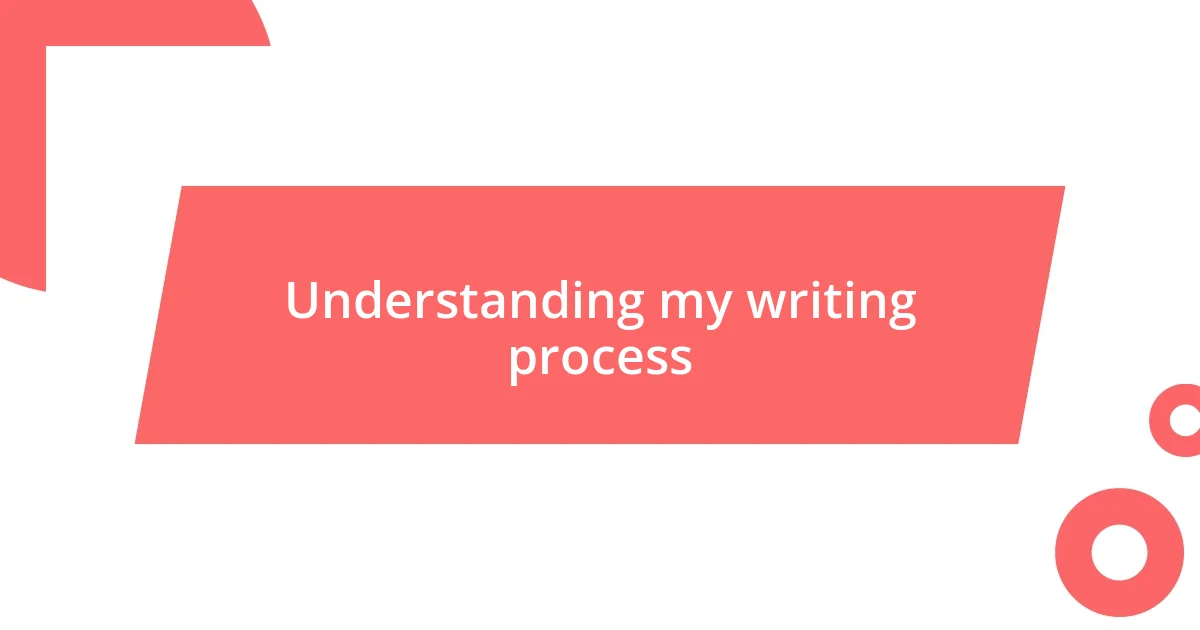
Understanding my writing process
Understanding my writing process starts with the quiet moments of reflection I carve out for myself. I often find that inspiration hits me during my early morning walks. Have you ever noticed how the world around you sparks ideas in unexpected ways? That stillness, combined with the gentle rhythm of my feet on the pavement, often leads me to clarity in my thoughts.
When I sit down to write, I always begin with a brainstorm. I lay out my ideas like pieces of a puzzle. Sometimes I feel overwhelmed by the enormity of a project, but I remind myself that it’s okay to take it one piece at a time. I tend to jot down a mix of random thoughts and structured outlines. This allows me to see the big picture while also capturing those fleeting ideas that pop into my head.
Revision is another key player in my writing process. I’ll admit, I don’t always enjoy this part, but it’s essential. Whether it’s slicing through unnecessary words or rephrasing a sentence to capture the readers’ attention better, I’ve learned that improving my writing often comes from allowing myself to step back and view it with fresh eyes. How do you approach this challenging stage? For me, sometimes taking a break or discussing my drafts with a trusted friend can illuminate the way forward.
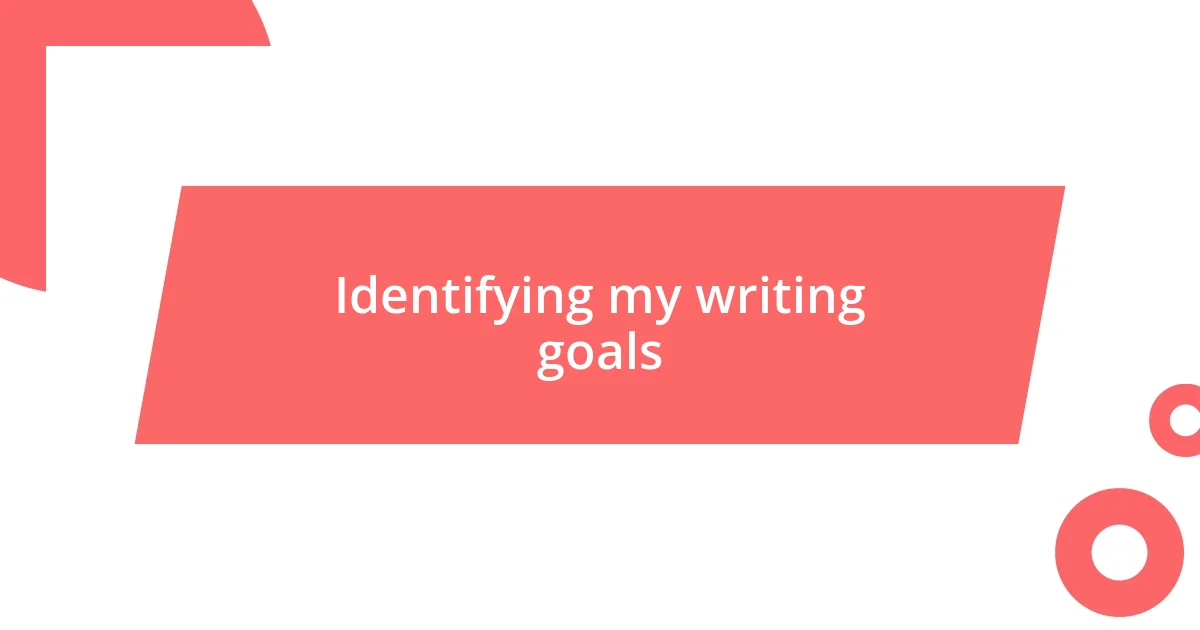
Identifying my writing goals
Identifying my writing goals is an essential step in my writing journey. I remember a time when I had a clear idea but no structured goal – the result was a multitude of unfinished drafts. Now, I set specific, measurable objectives. For instance, instead of saying, “I want to write more,” I tell myself, “I will complete a 1,500-word article each week.” This clear target keeps my motivation high.
When I think about my goals, I often reflect on both the process and the outcome. It’s not just about writing more; it’s about writing with purpose. One goal I try to focus on is honing my unique voice. I once wrote a piece that felt uninspired, as if I was mimicking others, but then I realized the importance of authenticity. Now, I strive not only to convey information but to share a piece of myself through my writing.
It’s also vital to reassess my goals regularly. I love setting new challenges for myself, like experimenting with different styles or tackling unfamiliar topics. Recently, I challenged myself to write poetry during National Poetry Month. That experience unlocked a new facet of my creativity, and I learned that embracing change can lead to rewarding growth. What goals will you set for yourself in your writing journey?
| Goal Type | Description |
|---|---|
| Process Goal | Focus on daily writing habits, such as spending 30 minutes every morning writing. |
| Outcome Goal | Measure success by completing a specific word count, like finishing a short story every month. |
| Skill Improvement Goal | Work on enhancing my writing voice and style through different genres. |
| Flexibility Goal | Set goals that can be re-evaluated and adjusted, ensuring they remain relevant to my growth. |
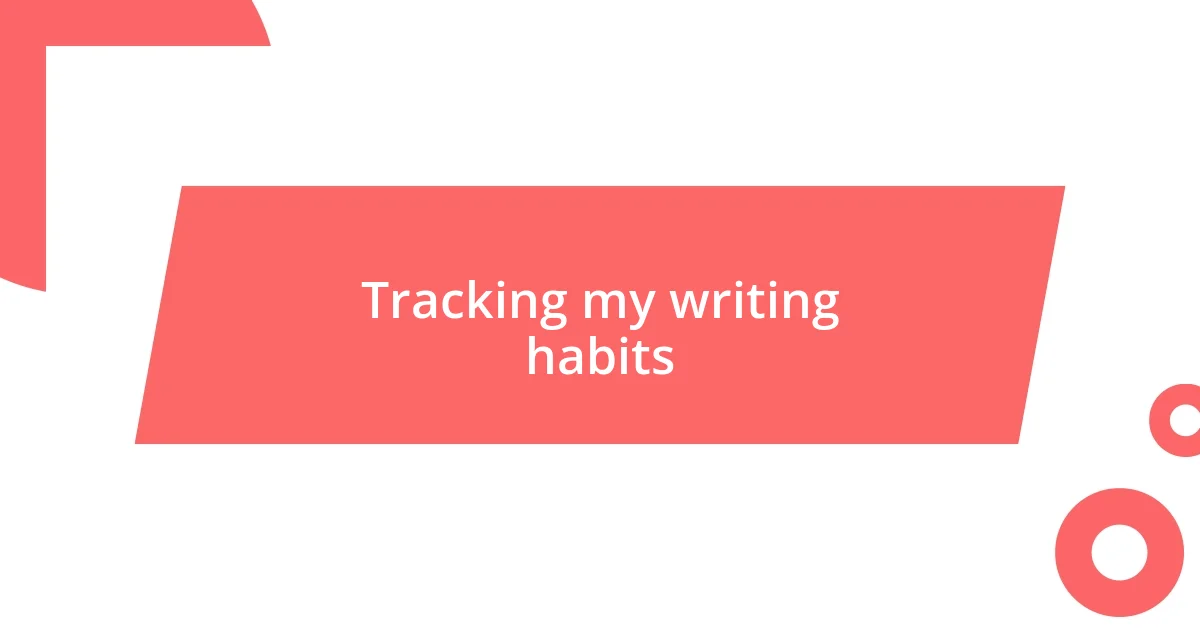
Tracking my writing habits
Tracking my writing habits has been a game-changer for me. I used to write in sporadic bursts, never fully aware of when my most productive times were. Once I began recording my sessions, I discovered that my best writing often happened in the early afternoon, which surprised me. It was enlightening to see how certain habits correlated with my creativity, and this knowledge has helped me create a more disciplined routine.
Here’s what I keep track of:
- Daily Writing Time: I log the hours spent writing each day. This helps me identify patterns.
- Word Count: I record my word count for each session, making it easier to see trends in productivity.
- Emotional State: I reflect on how I felt while writing—was I energized, frustrated, or inspired? This realization helps me understand my emotional influences.
- Distractions: By noting what distracted me during writing, I can develop strategies to minimize interruptions.
- Topics Explored: I maintain a list of ideas and themes that I’ve worked on. Revisiting these can reignite inspiration when I feel stuck.
The process of tracking has become almost therapeutic for me. I remember the first time I went through my logs; I felt like a detective piecing together the mystery of my writing rhythm. It was both exhilarating and a bit daunting, as I faced the reality of my habits. Yet, this self-awareness empowered me to reshape my environment and mindset to better suit my creative flow. Ultimately, tracking my writing habits has transformed not just my writing, but how I view myself as a writer.
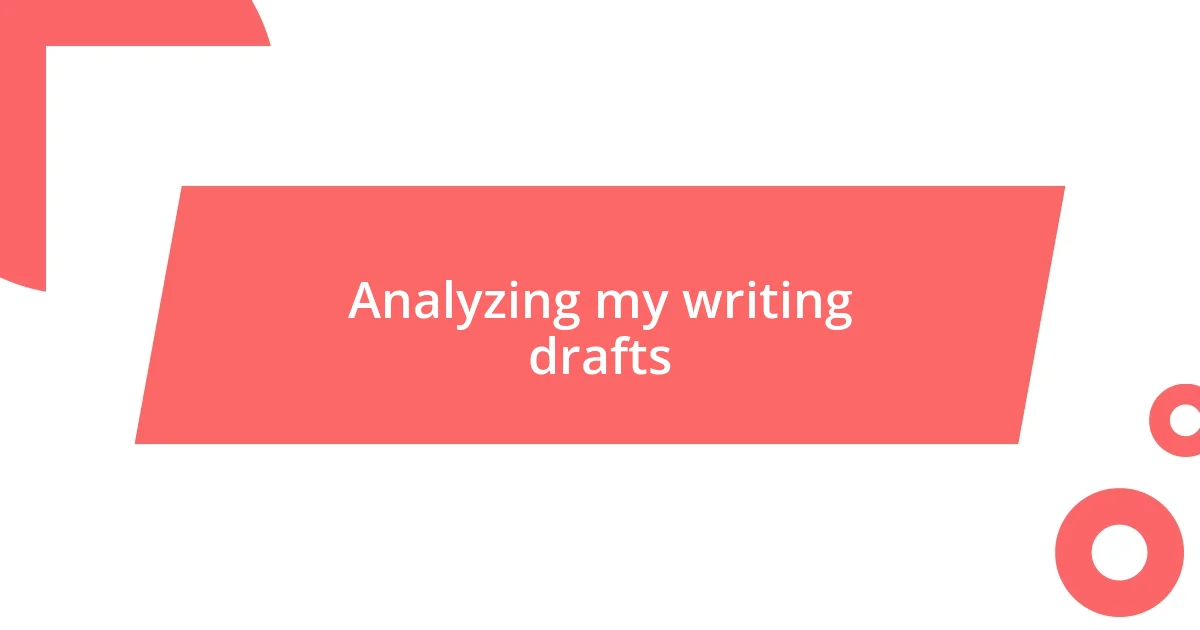
Analyzing my writing drafts
Analyzing my writing drafts is a crucial part of refining my craft. I often revisit my drafts with fresh eyes, armed with specific criteria. For instance, I ask myself if my main idea is clear and if the structure flows logically. One time, I looked back at a piece where I thought I’d nailed it, only to find that the argument was shaky and lacked coherence. That experience taught me the importance of stepping away from my writing before diving back in for analysis.
As I sift through my drafts, I pay close attention to my voice. I recall a moment when I reread a piece that felt flat and mechanical. I realized I was too focused on technical aspects and had lost my authentic tone. That’s when I decided to prioritize expressing my personality and emotions, transforming a bland draft into something vibrant. It’s fascinating how much transformation can occur simply by embracing my true self within the writing.
Feedback also plays a vital role in my analysis. Sharing my drafts with trusted peers has been enlightening. I remember a workshop where I presented a draft that I thought was solid. The feedback forced me to reevaluate my assumptions, revealing blind spots I hadn’t considered. This collaborative process not only deepened my understanding of my work but also reinforced the notion that writing isn’t just a solitary endeavor—it’s often enriched by the perspectives of others. How do you think feedback shapes your writing?

Gathering feedback on my writing
Gathering feedback on my writing has always been a pivotal part of my development. I vividly remember the first time I shared a piece with a writer’s group. My palms were sweaty, and my heart raced as they read my work. The constructive criticism I received was invaluable, as it shed light on my blind spots that I had never acknowledged. I learned that feedback isn’t just about fixing flaws; it’s about discovering new dimensions in my writing.
Sometimes, feedback feels like a mirror reflecting not just my writing skills but also my strengths and weaknesses. For instance, there was a time when a fellow writer remarked on how my humor added a unique flavor to my piece. Suddenly, I realized that leaning into my quirky sense of humor was an asset, not a liability. This moment of realization encouraged me to experiment more with my voice, leading to pieces that felt more alive and engaging. Have you ever discovered aspects of your writing that you didn’t know were there?
I find that gathering feedback regularly helps me remain grounded, preventing me from getting too attached to my work. After all, we’re often too close to our writing to see it clearly. I remember when I submitted an article to a blog I’d been following for years, convinced it was perfect. The editor’s feedback was tough to swallow, but it taught me how to view my writing from a reader’s perspective. That experience reminded me that while I can pour my heart into my words, the ultimate goal is to connect with others through them. How has sharing your work changed the way you write?
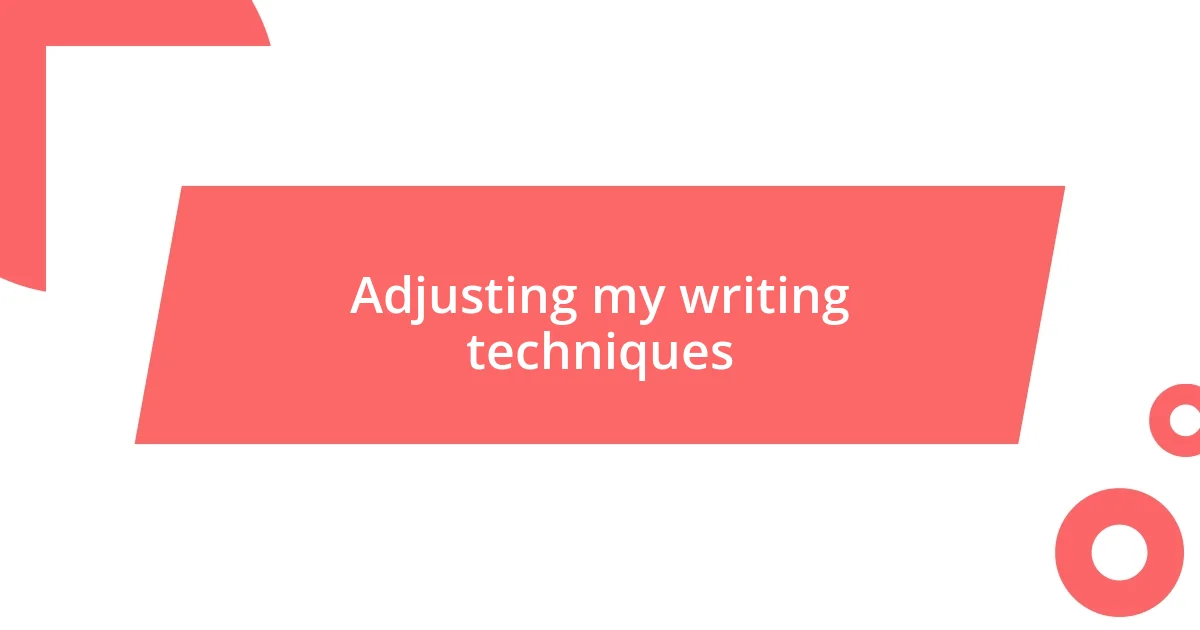
Adjusting my writing techniques
Adjusting my writing techniques is an ongoing journey. I often find myself experimenting with different styles or structures, especially after receiving feedback that resonates with me. One time, a reader noted that my articles felt overly formal. It struck me hard; I realized I wanted my voice to feel approachable and warm. So, I started adding personal anecdotes more frequently, hoping to connect with my audience on a deeper level. Have you ever tweaked your style based on someone else’s perspective?
I’ve also played with pacing and length in my pieces. There was a particularly dense article I wrote once, and the feedback was clear: it needed a break. I took the constraints off and crafted shorter paragraphs with punchy sentences. The rhythm changed remarkably. My writing flowed more smoothly, and I could feel the engagement levels rise. Isn’t it interesting how changing a few words can impact the entire reading experience?
Another adjustment involves embracing spontaneity in my writing process. Initially, I would over-plan every piece, leaving little room for creativity to breathe. However, during a particularly vivid brainstorming session with a friend, I just let my ideas spill out. This shift transformed my writing into a more authentic expression of my thoughts. I learned that sometimes the best insights emerge when I let go of structure and allow my voice to shine freely. Have you ever felt the thrill of spontaneity during your writing?
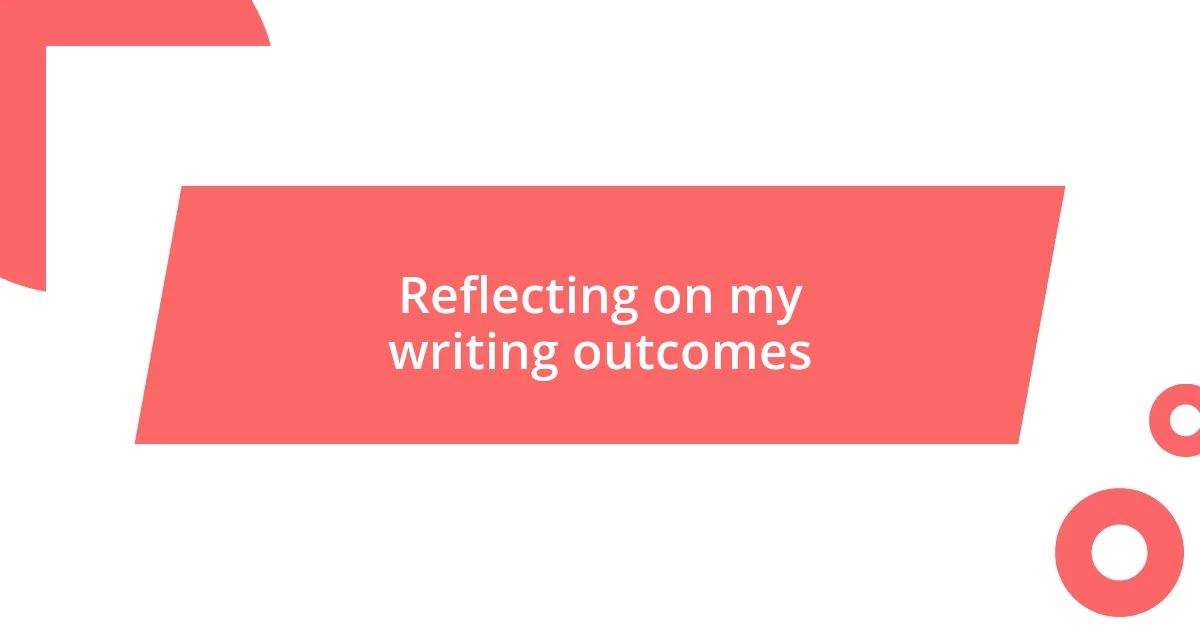
Reflecting on my writing outcomes
Reflecting on my writing outcomes often feels like peering into a layered tapestry of my growth. I remember the satisfaction I felt when I received positive feedback on an article I crafted from scratch. It was such a validation that all the late nights and revisions were worth it. Yet, amidst the praise, I discovered areas for improvement. While my approach resonated well, some readers pointed out that certain passages were unclear. I had to ask myself: How can I simplify my thoughts without losing my essence? This realization sparked a commitment to clarity in my writing.
As I analyze the reactions to my work, I find myself digging deep into my emotions tied to each piece. An article I wrote about vulnerability garnered unexpected responses, reminding me of my own journey through similar experiences. It was both uplifting and humbling to see how my words could connect so profoundly with others. I often wonder what impact my writing truly has. Do my words inspire change, evoke laughter, or provide comfort? Reflecting on these outcomes gives me the motivation to explore those emotions further, turning them into relatable narratives.
I’ve noticed that my writing outcomes teach me more than just techniques; they reveal my voice’s evolution. For instance, after a series of writing projects, I felt a shift in tone and style that surprised me. Early on, I focused heavily on technical perfection, but now, I embrace imperfections. I remember reading a piece from an author who seemed so raw and honest, it inspired me to let go of the need for every sentence to shine perfectly. How liberating it felt to write with authenticity, stripping away the layers of pretense! Reflection on this change has encouraged me to continue exploring the nuances of my voice. Have you ever felt your writing take on a life of its own as you embraced your true self?










